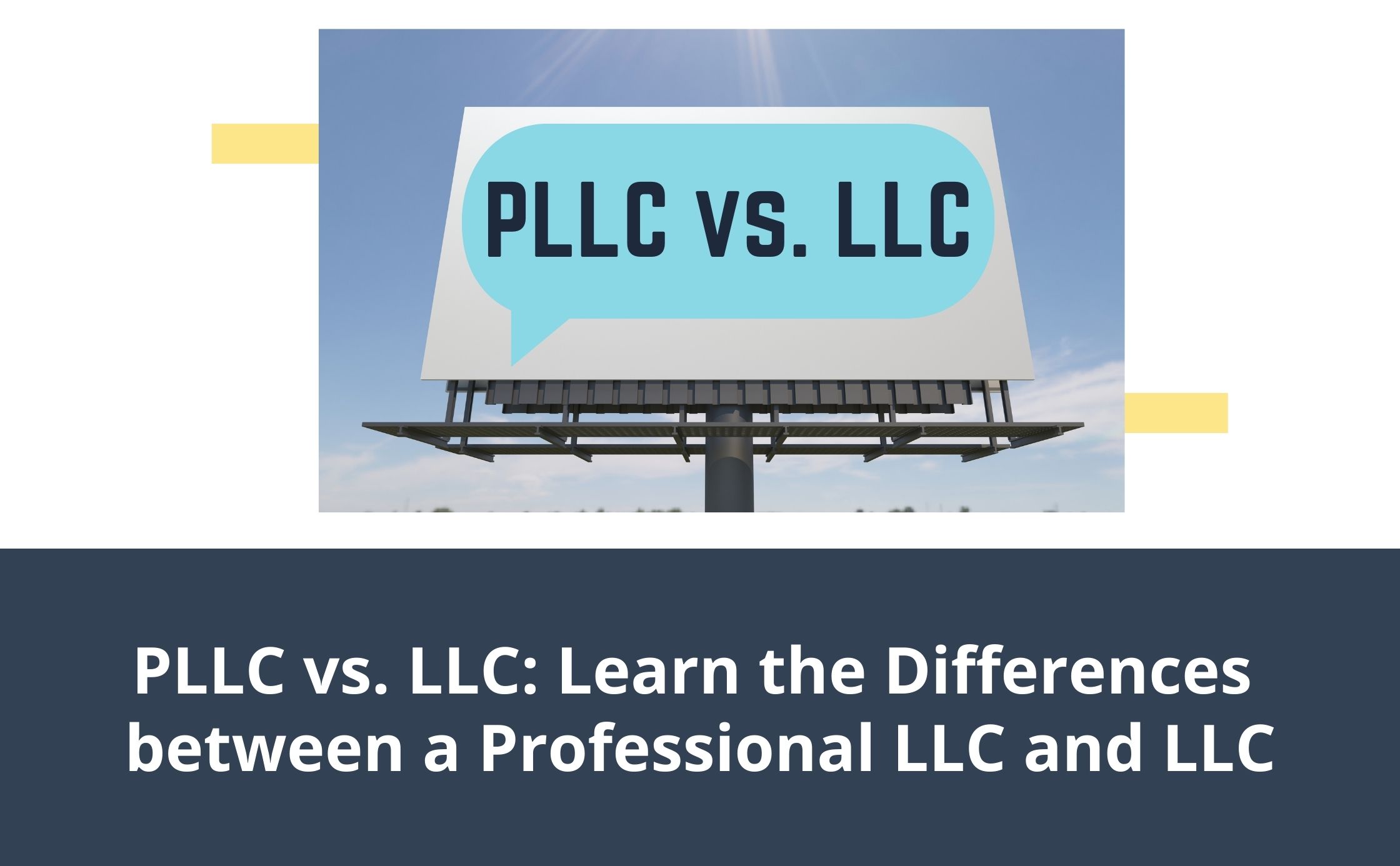If you’re an aspiring small business owner or licensed professional, you may wonder if you should register as a PLLC or LLC. PLLCs (Professional Limited Liability Companies) and LLCs (Limited Liability Companies) are different business structures used in the United States. Both types of structures have similarities and differences. If you’re a small business owner or entrepreneur, you’ll want to explore the two business entity options and decide which option is best for you. Here’s everything you need to know:
What is an LLC (Limited Liability Company)?
An LLC is a business structure designed to protect owners from financial hardship that occurs when owning a business. With this structure, the liability is limited for the business owners. This means your car, home, or investments will always be protected if your business experiences substantial financial loss.
LLCs are a state-level initiative, which means they aren’t taxed on a federal level. This also means that the federal government typically views owners of an LLC as self-employed and may need to pay a self-employment tax. However, most LLC business owners can also register as a C-corp or S-corp to avoid additional taxes.
What is a PLLC (Professional Limited Liability Companies)?
PLLC stands for professional limited liability companies. A PLLC is designed for individuals who are required to obtain a specific certification or license to work in the state they reside in. For example, individuals who own a law firm or medical office must be licensed by the state to own their business. The individuals who work and own the law firm or physician’s office would all have ownership of the PLLC. All other business owners must have the same necessary licenses to be registered under the PLLC.
A PLLC offers personal liability protection and asset protection for all owners who have ownership of the PLLC. This comes in handy when you have multiple doctors who work under one physician’s office.
For example, if a medical office is hit with a lawsuit, only the physician who worked with the patient would be held responsible, not the other doctors who work for the same office. The individual who is hit with the lawsuit should have additional personal liability protection to protect them in these instances.

LLC vs. PLLC: How They Compare
An LLC and PLLC are similar in many ways, but the exact limitations and advantages may vary by state. Here’s a quick overview of how they compare:
Ownership
- LLC: LLCs can be owned by businesses, corporations, or foreign entities. There are also two options, single-owner LLC and multi-member LLC, for business entities with more than one owner.
- PLLC: A PLLC can only be owned by individuals with the specific licenses or certifications needed for their profession. This means this business structure is only available for individuals with a professional license.
State Recognition
- LLC: An LLC is recognized on the state level, not the federal level. Most states recognize LLCs, but the laws and regulations around taxation or liability may vary from state to state. For example, an LLC in Arizona does not impose a separate state-level tax, while California requires LLCs to pay an $800 annual franchise tax plus additional fees based on total income.
- PLLC: PLLCs are not widely recognized in all 50 states, and the regulations vary from state to state. As of 2025, 32 states recognize PLLCs, but most require proof of specific licenses to form one.
Taxation
- LLC: Since an LLC is a pass-through entity, the taxes are passed to the individual’s personal taxes. This means the owner of the LLC may be required to pay additional self-employment taxes. To avoid self-employment taxes, you can also be taxed as a corporation if your business is a registered S-Corp or C-Corp. It’s best to consult with your tax professional to decide what option is right for you.
- PLLC: A PLLC is also a pass-through entity with a similar setup to an LLC. Owners of a PLLC can also register their corporation to avoid the gains and losses of the business being reported on their personal taxes.
Professional licenses
- LLC: An LLC is typically obtained by small business owners, entrepreneurs, or startups. There are no restrictions on who can and can’t own an LLC. The main requirement across all of the states is the owner must be over the age of 18.
- PLLC: Specific licenses or certifications are required to own a PLLC. If you’re unsure if you qualify for a PLLC, it’s recommended that you read the specific requirements for the state you live in.
Disadvantages of an LLC
An LLC offers limited liability for owners, which is important if you want to protect your personal assets. It’s also relatively easy to set up and offers some tax flexibility for business owners.
However, the main disadvantage of owning an LLC is that you may be required to pay more in taxes. The federal government will add a self-employment tax to ensure you’re paying for Social Security and Medicare.
There may also be additional state-specific fees and regulations that you may be required to pay after forming an LLC. It’s best to read through the state-specific guidelines.
Disadvantages of a PLLC
To obtain a PLLC, you must abide by the specific state requirements. All owners of the PLLC must also have the necessary licenses and certifications. Not only are PLLCs reserved for individuals with specific professional licenses, but not recognized in all states. There are also more legal limitations in certain states.
LLC vs. PLLC: What is the Difference?
The main difference between an LLC vs. PLLC is who can own one. PLLCs are typically only reserved for professionals with specific licenses and certifications. However, the legal requirements and overall business structure can vary from state to state.
If you’re unsure which business structure is best for you, consider consulting with your tax professional for additional guidance. You can also read more about the laws and regulations on the specific state government web page.

